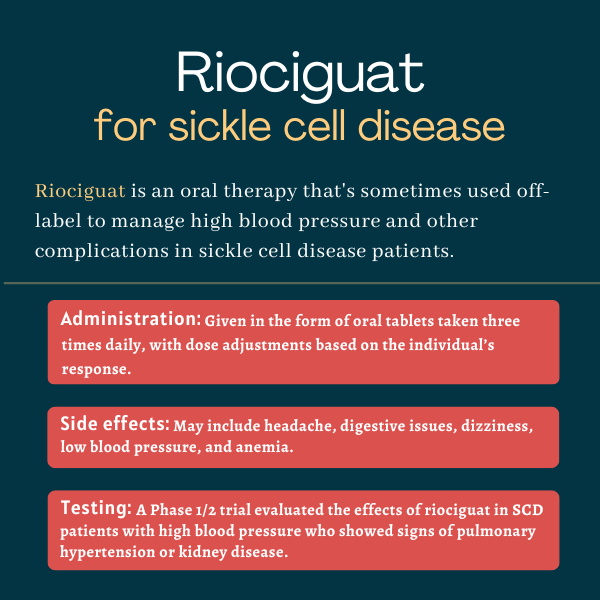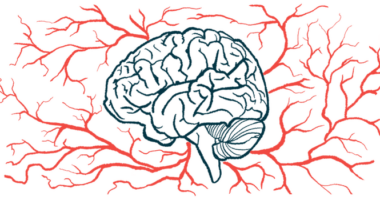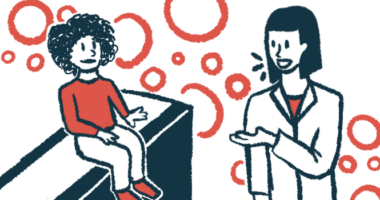Riociguat for sickle cell disease
Last updated July 30, 2024, by Marisa Wexler, MS

What is riociguat for sickle cell disease?
Riociguat is an oral therapy that’s approved to treat some forms of pulmonary hypertensionn (PH) — disorders characterized by high blood pressure in certain blood vessels in the lungs. The therapy is not approved to treat sickle cell disease (SCD), but it has been used off-label in SCD patients to help manage high blood pressure and other complications.
Brand names and formulations
In the U.S., riociguat is sold under the brand name Adempas by Bayer. Generic versions of the medication also are available. Adempas was approved by the U.S. Food and Drug Administration (FDA) in October 2013 to treat pulmonary hypertension, known as PH for short. It is specifically indicated:
- for adults with chronic thromboembolic pulmonary hypertension that persists after surgery, or who are not eligible for surgery, to improve functional class and exercise capacity
- for adults with pulmonary arterial hypertension, to improve exercise capacity and functional class, and delay clinical worsening.
The medication also has been approved for similar indications in other markets.
Therapy snapshot
| Treatment name: | Riociguat |
| Administration: | Oral tablets |
| Clinical testing: | A Phase 1/2 trial evaluated the effects of riociguat in sickle cell disease patients |
How does riociguat work?
In SCD, gene mutations lead to the production of an abnormal form of hemoglobin, the protein that red blood cells use to carry oxygen through the bloodstream. The abnormal version of hemoglobin tends to form clumps inside red blood cells, deforming them into the sickle-like shape that gives the disease its name. Sickled red blood cells are more fragile than healthy red blood cells, and tend to break down faster. Their premature destruction, known as hemolysis, can lead to anemia and other SCD symptoms.
At a biochemical level, one of the main consequences of frequent hemolysis is a reduction in the levels of an important signaling molecule called nitric oxide (NO), which helps regulate blood pressure. NO normally works to activate an enzyme called soluble guanylate cyclase (sGC), which sets off a chain of molecular signaling events that ultimately cause blood vessels to relax, reducing blood pressure. In SCD, low NO levels mean this pathway is less active, which may contribute to certain health problems, including high blood pressure, PH, and kidney disease.
Riociguat works to activate the sGC enzyme, turning on that molecular signaling pathway and ultimately helping to reduce blood pressure, which is the mechanism by which the therapy exerts its therapeutic effects in PH. Activating this pathway may potentially help reverse health problems in SCD that are related to low NO levels.
How is riociguat administered in sickle cell disease?
Riociguat is supplied in the form of oral tablets that are available at several dosage strengths: 0.5, 1, 1.5, 2, and 2.5 mg. These tablets may be swallowed whole, or crushed and mixed with water or soft foods for individuals who have difficulty swallowing.
In people with PH, riociguat is recommended to be started at a dosage of 1 mg three times per day. Lower doses can be used for patients who may not tolerate the blood pressure-lowering effects of the therapy. The dose can then be adjusted based on how the patient responds, with 0.5 mg increments made every other week up to a maximum dose of 2.5 mg, taken three times per day.
Given that riociguat is not approved for SCD, there are no standardized guidelines for dosing for patients with this condition. A Phase 1/2 clinical trial that tested riociguat in SCD patients followed the same dosing schedule currently recommended for those with PH: a starting dose of 1 mg three times daily, which could be increased by 0.5 mg every other week, up to a maximum dose of 2.5 mg three times daily if needed.
Riociguat in sickle cell disease clinical trials
A Phase 1/2 clinical trial, called STERIO-SCD (NCT02633397), assessed the effects of riociguat in SCD patients who had high blood pressure and showed signs of PH or kidney disease.
The study enrolled a total of 130 people with SCD who were randomly assigned to receive riociguat or a placebo, both given orally at a starting dose of 1 mg three times daily, for 12 weeks, or about three months.
The main goal of STERIO-SCD was to evaluate riociguat’s safety. This specific goal was established because previous research had shown that sildenafil — another blood pressure-lowering medication that’s approved for PH (sold as Revatio, among other brand names), but that works via a different biological mechanism — led to an increase in pain-related hospital admissions when tested in people with SCD.
The STERIO-SCD trial sought to determine whether this unfavorable safety profile was specific to sildenafil and other therapies in its class (phosphodiesterase-5 inhibitors), or if it might also apply to riociguat. As such, the study’s main goal was to assess the proportion of patients given riociguat or the placebo who had at least one treatment-emergent serious adverse event.
The rates of serious safety issues were slightly lower in patients on riociguat (22.7%) compared with those on the placebo (31.3%), with no significant differences in safety outcomes seen in either group, the results showed.
Analyses from STERIO-SCD also indicated that treatment with riociguat was able to significantly reduce blood pressure and led to improvements in some measures of heart health. However, it did not affect other measures, including assessments of fatigue and kidney health.

Common side effects of riociguat
The safety profile of riociguat specifically in people with SCD is not fully known. In its approved indications, common side effects of riociguat include:
- headache
- indigestion
- stomach inflammation (gastritis)
- dizziness
- nausea and/or vomiting
- diarrhea
- low blood pressure (hypotension)
- anemia
- gastroesophageal reflux
- constipation.
Fetal toxicity
Riociguat’s prescribing information carries a boxed warning noting that the therapy can cause harm to a developing fetus if used during pregnancy. Due to this risk, in the U.S., riociguat is only available to female patients through a Risk Evaluation and Mitigation Strategy (REMS) program. All female patients must enroll in this program, irrespective of their ability to become pregnant, before starting treatment with riociguat. Additionally, providers prescribing riociguat to female patients are required to enroll in the REMS program and undergo special training to be properly certified to do so. Only certified pharmacies can dispense the medication to the female patients who are authorized to receive it.
Riociguat is contraindicated in females who are pregnant. Women and girls who have the potential to become pregnant should use an effective form of contraception while taking riociguat and for at least one month after the last dose. These patients also should take monthly pregnancy tests to ensure an accidental pregnancy has not occurred. A negative pregnancy test result is also required before the start of treatment and one month after its discontinuation.
Low blood pressure
Riociguat works to lower blood pressure, and in some patients, it may result in symptoms of hypotension, or abnormally low blood pressure, such as lightheadedness or dizziness. Dose adjustments may be considered for patients who experience or are at risk of symptomatic hypotension.
Bleeding
In clinical trials of people with PH, serious bleeding events were reported in slightly more than 2% of patients given riociguat, while no serious bleeding events were reported among those given a placebo. There also was one case of hemoptysis, or coughing up blood, that ultimately was fatal.
Pulmonary veno-occlusive disease
Riociguat is not recommended for use in individuals with pulmonary veno-occlusive disease (PVOD), a rare form of PH that can arise when blood vessels carrying oxygen-rich blood from the lungs to the heart are blocked. If patients on riociguat develop signs of swelling, or edema, in the lungs, they should be evaluated for PVOD; if PVOD is confirmed, riociguat should be stopped.
Use in pregnancy and breastfeeding
Limited data are available on the use of riociguat in pregnant women. However, animal studies have shown that the administration of the therapy during pregnancy can lead to spontaneous abortion and fetal defects. Based on these findings, it has been determined that riociguat may be harmful to a developing fetus and cause miscarriage when administered to a pregnant woman. Its use is thereby contraindicated, or not recommended, during pregnancy.
There are no data on the presence of riociguat in breastmilk, or on the potential effects its use may have on the nursing infant, or on milk production. The therapy is known to be present in rat milk, however. Due to the potential of serious adverse reactions to breastfed infants, particularly hypotension, it is recommended that women abstain from breastfeeding while receiving treatment with riociguat.
Sickle Cell Disease News is strictly a news and information website about the disease. It does not provide medical advice, diagnosis, or treatment. This content is not intended to be a substitute for professional medical advice, diagnosis, or treatment. Always seek the advice of your physician or other qualified health provider with any questions you may have regarding a medical condition. Never disregard professional medical advice or delay in seeking it because of something you have read on this website.
Recent Posts
- Gene-editing therapy may cut stroke risk in SCD, small study finds
- Dosing started in Phase 1 study of globin-switching therapy CLY-124
- What I’ve learned about life, love, and sacrifice due to caregiving
- ED pain scores may predict future hospitalization for SCD children
- What to consider before making a change to your treatment regimen
- Buprenorphine may reduce opioid use for sickle cell disease patients
- Reflecting on 4 years of sharing my experiences with sickle cell
- Level of physical activity tied to less pain, blood viscosity in SCD: Study
- Celebrating ourselves is a way to promote sickle cell awareness
- BEAM-101 shows sustained benefits as treatment for sickle cell
Related articles






